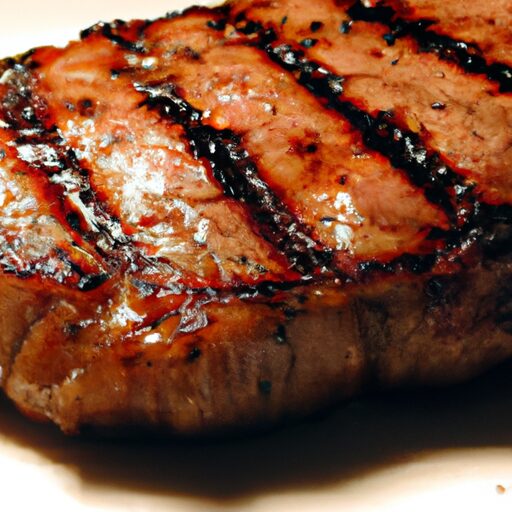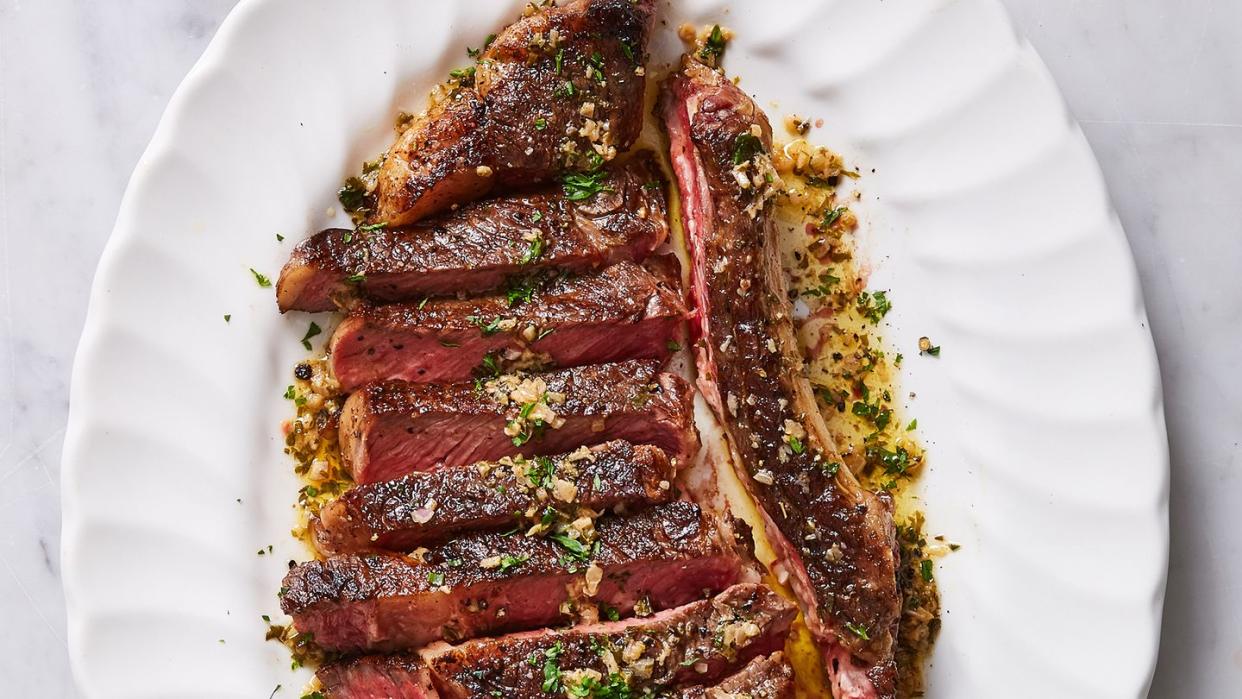
Attention steak lovers! Are you tired of your grilled steaks lacking flavor? We have some exciting news for you. Contrary to popular belief, it turns out that grilled steak should actually be seasoned with more salt than you might think.
Yes, you heard that right! The amount of salt needed to properly season your steak is often underestimated, resulting in a lackluster dining experience. But fear not, because seasoning with more salt not only enhances the flavor of the steak but also ensures that it is properly seasoned throughout. Just make sure to evenly distribute the salt on both sides of the steak before grilling.
And don’t worry about making it taste too salty – most of the salt will be absorbed during cooking. So grab your aprons and get ready to elevate your grilled steak game to new heights with a generous helping of salt!
The Importance of Properly Seasoning Grilled Steak

This image is the property of s.yimg.com.
Grilling a steak to perfection requires more than just getting the right cooking temperature and timing. One crucial yet often overlooked aspect of grilling steak is proper seasoning. Seasoning your steak with the right amount of salt is essential for enhancing its flavor and ensuring a delicious dining experience.
In this article, we will explore the importance of properly seasoning grilled steak and share tips and techniques to help you achieve perfectly seasoned results every time.
You may also like
Underestimating the Amount of Salt Needed
When it comes to seasoning grilled steak, it’s common for people to underestimate the amount of salt needed. Many home cooks tend to be cautious with salt, fearing that it will make the steak taste overly salty. However, the reality is that grilled steak should be seasoned with more salt than you might think.
Enhancing the Flavor of the Steak
One of the primary reasons for adequately seasoning grilled steak is flavor enhancement. Salt acts as a natural flavor enhancer, bringing out the best in the meat. When used in the right amount, salt helps to elevate the steak’s flavor profile and brings out its natural juiciness.
Ensuring Even Seasoning Throughout
Another essential aspect of seasoning grilled steak is ensuring even seasoning throughout the meat. Uneven seasoning can result in certain parts of the steak tasting either too salty or lacking flavor. To ensure even seasoning, it’s crucial to distribute the salt evenly across the entire surface of the steak.
Properly Distributing Salt on Both Sides
To achieve even seasoning, it’s important to distribute salt on both sides of the steak. One common mistake people make is only seasoning one side of the steak, neglecting the other side. Each side of the steak should receive a generous amount of salt to ensure a balanced flavor and optimal taste.
Understanding the Impact of Salt on Grilled Steak
Now that we understand the importance of properly seasoning grilled steak, let’s delve into the impact of salt on the meat during the cooking process.
Absorption of Salt During Cooking
Contrary to popular belief, seasoning your steak with more salt will not make it taste overly salty. During the cooking process, much of the salt is absorbed into the meat, enhancing its flavor from the inside out. This absorption helps to infuse the steak with a delicious umami taste that complements the natural flavors of the meat.
Importance of Salt in Tenderizing the Meat
Salt not only enhances the flavor but also plays a crucial role in tenderizing the meat. When salt is applied to the surface of the steak, it draws out moisture through osmosis.
As the moisture is drawn out, it creates a flavorful brine that is then reabsorbed into the meat. This reabsorption process helps to break down the protein structure, resulting in a tender and juicy steak.
Balancing the Taste with Salt
Another reason salt is essential in properly seasoning grilled steak is its ability to balance the overall taste. Salt acts as a flavor amplifier, enhancing other flavors present in the steak. By using the right amount of salt, you can create a well-balanced and delicious final product.
Avoiding a Salty Steak
While salt is crucial for delicious grilled steak, it’s important to avoid making the meat taste overly salty. To prevent this, it’s essential to find the right balance and ensure proper distribution of salt. Additionally, if you accidentally oversalt the steak, there are ways to mitigate the saltiness, such as by serving it with acidic ingredients or balancing it with other seasonings.
Factors to Consider for Proper Salt Seasoning
To achieve optimal salt seasoning for your grilled steak, there are several factors to consider.
Thickness and Cut of the Steak
The thickness and cut of the steak will influence the amount of salt needed for proper seasoning. Thicker steaks require more salt to adequately penetrate and flavor the meat, while thinner cuts may need less salt. It’s important to consider the size and thickness of your steak when determining the amount of salt to use.
Personal Preferences and Dietary Restrictions
Everyone’s taste preferences and dietary restrictions vary, making it important to take these factors into account when seasoning grilled steak. Some individuals may prefer their meat saltier, while others may have dietary restrictions that limit their sodium intake. Adjusting the salt amount based on personal preferences and dietary needs is essential for a satisfying dining experience.
Type of Salt to Use
There are various types of salt available, and the choice of salt can impact the flavor and seasoning of your grilled steak. Common options include kosher salt, sea salt, and table salt. Each type of salt has its own distinct flavor profile and texture, so it’s important to choose the one that best suits your taste and desired outcome.
Other Seasonings and Herbs
In addition to salt, other seasonings and herbs can be used to further enhance the flavor of your grilled steak. Pepper, garlic, and herb combinations can complement the salt and add depth to the overall taste. Experimenting with different seasoning blends can help you discover unique and delicious flavor combinations that elevate your grilled steak to new heights.
Techniques for Seasoning Grilled Steak with Salt

This image is property of s.yimg.com.
Now that we’ve covered the factors to consider for proper salt seasoning, let’s dive into some techniques for seasoning the grilled steak.
Dry-Brining the Steak
One technique for seasoning grilled steak with salt is dry-brining. Dry-brining involves applying salt to the steak and letting it sit for an extended period before grilling.
This technique allows the salt to penetrate the meat gradually, resulting in a well-seasoned and tender steak. To dry-brine, generously salt both sides of the steak and refrigerate for at least one hour (or up to overnight) before grilling.
Salting in Advance vs. Just Before Grilling
Another consideration is whether to salt the steak in advance or just before grilling. Both methods can yield delicious results, and the choice depends on personal preference and time constraints.
Salting in advance allows the salt to penetrate the meat, enhancing the flavor and tenderness. However, if you’re short on time, salting just before grilling can still yield flavorful results.
Applying Salt on Both Sides
To ensure even seasoning, it’s crucial to apply salt on both sides of the steak. This ensures that every bite is properly seasoned and balanced in flavor. Don’t be shy when applying salt – the meat can absorb more than you might think, preventing the steak from tasting overly salty once cooked.
Allowing Salt to Rest on the Steak
After applying salt to the steak, it’s beneficial to allow it to rest at room temperature for a short period. This resting time allows the salt to dissolve and evenly distribute its flavors throughout the meat. Allowing the salt to rest on the steak for about 30 minutes before grilling can make a noticeable difference in flavor and tenderness.
Tips for Achieving Perfectly Seasoned Grilled Steak
To help you achieve perfectly seasoned grilled steak, we have some tips for you to consider.
Experimenting with Different Salt Amounts
Finding the perfect salt-to-steak ratio can require some experimentation. Start by using the recommended amount of salt and gradually adjust to your taste preferences. Remember that it’s better to slightly underseason than to oversalt, as you can always add more salt later if needed.
Using a Salt Grind to Control Seasoning
Using a salt grind or grinder can give you more control over the amount of salt you apply to your steak. Coarser grinds allow for a more even distribution, while finer grinds can result in a denser salty flavor. Experimenting with different salt grinds can help you find the texture that suits your preference.
Testing Saltiness with a Small Piece
If you’re unsure about the saltiness of your seasoned steak, you can always test it with a small piece before grilling the entire steak. This way, you can assess the flavor and adjust the seasoning as needed.
Allowing the Steak to Rest Before Cutting
Once your steak is grilled to perfection, it’s important to allow it to rest before cutting into it. This resting period allows the juices to redistribute and settle, resulting in a more flavorful and tender steak. Resist the temptation to cut into the steak immediately, as this can cause the juices to escape, resulting in a drier steak.
Understanding the Science Behind Salt Seasoning
To truly appreciate the importance of properly seasoning grilled steak with salt, it’s helpful to understand the science behind it.
Osmosis and Flavor Absorption
When salt is applied to the surface of the steak, it triggers a process called osmosis. Osmosis is the movement of liquid from an area of lower solute concentration (the steak) to an area of higher solute concentration (the salt). As the steak releases its moisture, it creates a flavorful brine that is later reabsorbed by the meat. This osmotic process helps to infuse the steak with a rich and savory taste.
Breaking Down of Protein Structure
Salt also plays a role in breaking down the protein structure of the meat. As salt draws out moisture, it disrupts the protein bonds, resulting in a tenderizing effect. This process helps to reduce the steak’s toughness and contributes to its overall texture and mouthfeel.
Chemical Reactions with Heat
When the seasoned steak is exposed to heat during grilling, chemical reactions occur that further enhance the flavor and appearance.
The Maillard reaction, for example, is a chemical reaction between amino acids and reducing sugars that gives grilled meat its characteristic brown crust and savory flavors. Salt plays a vital role in this reaction, adding depth and complexity to the final taste of the steak.
Impact of Salt on Juiciness

This image is property of s.yimg.com.
Properly seasoning grilled steak with salt can also affect its juiciness. While salt draws out moisture initially, it helps to retain moisture during the cooking process. This moisture retention contributes to a juicy and succulent steak that is a delight to bite into.
Alternatives and Complementary Seasonings
While salt is a staple seasoning for grilled steak, there are a variety of alternatives and complementary seasonings to consider to further enhance the flavors.
Pepper, Garlic, and Herb Combinations
Pepper, garlic, and various herbs can be combined with salt to create additional layers of flavor. Black pepper adds a hint of spiciness, garlic adds a savory note, and herbs like rosemary or thyme impart a delightful aroma.
Experimenting with different combinations can help you discover unique and delicious profiles that complement the natural flavors of the grilled steak.
Marinades and Brines
Marinades and brines offer an alternative method of seasoning your grilled steak. These solutions typically consist of a combination of salt, acid (such as vinegar or citrus juice), and various flavoring agents.
Marinating or bringing the steak before grilling can infuse it with a range of flavors and contribute to the tenderness of the meat. Keep in mind that extended marinating times may result in a saltier end result, so adjust accordingly.
Seasoning Rubs and Spice Blends
Seasoning rubs and spice blends are another avenue for adding flavor to your grilled steak. These mixtures typically consist of a variety of spices, herbs, and sometimes salt.
Rubbing the steak with these blends before grilling can create a delicious crust and impart a complex blend of flavors. From Cajun spice blends to smoky barbecue rubs, there are countless options to explore.
Balancing Flavors with Acidic Ingredients
In addition to salt and other seasonings, acidic ingredients can also help to balance the flavors of your grilled steak. Adding a squeeze of lemon juice or a splash of balsamic vinegar can provide a tangy contrast that enhances the overall taste experience.
Common Mistakes to Avoid When Salting Grilled Steak
To ensure your grilled steak is seasoned to perfection, it’s important to avoid common mistakes that could affect the final result.
Salting Too Early or Too Late
Timing is crucial when it comes to salting your grilled steak. Salting too early can result in the meat losing moisture and becoming dry.
On the other hand, salting too late may not allow enough time for the salt to penetrate and enhance the flavor. It’s best to season your steak just before grilling or opt for the dry-brining method if salting in advance.
Using Too Little Salt
Underseasoning the steak by using too little salt can lead to a bland and lackluster final product. Remember that the steak needs a generous amount of salt to bring out its natural flavors and enhance the overall taste. Don’t be afraid to season with enough salt to ensure a well-seasoned steak.
Using an Uneven Amount of Salt
Unevenly distributing salt on the steak can lead to inconsistent seasoning and potentially one side being overly salty. To achieve even seasoning, make sure to apply salt evenly to both sides of the steak. This will ensure each bite is full of flavor and balance.
Neglecting to Taste and Adjust

This image is the property of s.yimg.com.
Tasting the steak before and during the cooking process is crucial in determining the saltiness and flavor balance. If you find the steak is under or over-seasoned, it’s important to adjust accordingly. You can add more salt if needed or balance the flavor with other seasonings or ingredients.
FAQs About Salting Grilled Steak
Here are some frequently asked questions about salting grilled steak to provide further insight and guidance.
Can I use other types of seasoning instead of salt?
While salt is a key ingredient for properly seasoning grilled steak, you can certainly incorporate other types of seasoning to enhance the flavors. However, it’s important to use salt in conjunction with other seasonings to ensure proper flavor balance and bring out the best in the meat.
How long should I let the salt sit on the steak?
The amount of time you let the salt sit on the steak depends on the method you choose. For general seasoning, salting just before grilling is sufficient. However, if you opt for dry-brining, it’s recommended to let the salt sit on the steak for at least one hour or up to overnight in the refrigerator.
Is it necessary to salt the steak in advance?
Salting the steak in advance is not necessary but can yield benefits in terms of flavor and tenderness. Salting in advance allows the salt to penetrate the meat, resulting in a more seasoned and flavorful steak. However, if you’re short on time, salting just before grilling can still produce delicious results.
What if I have dietary restrictions or preferences?
If you have dietary restrictions or preferences that limit your salt intake, you can adjust the amount of salt used accordingly. There are also low-sodium or salt-free seasoning options available that can provide flavor without the sodium. Consult with a healthcare professional or dietician for personalized advice regarding your dietary restrictions.
Bringing Out the Best in Grilled Steak
Properly seasoning grilled steak with salt is an art form that can elevate your grilling game to new heights. By understanding the impact of salt on the meat, considering various factors, and employing effective techniques, you can achieve perfectly seasoned results every time.
Whether you prefer a classic salt seasoning or enjoy experimenting with different flavor profiles, the key is to find the right balance that brings out the best in your grilled steak. So fire up the grill, season that steak to perfection, and savor the flavorful results that await you. Happy grilling!








